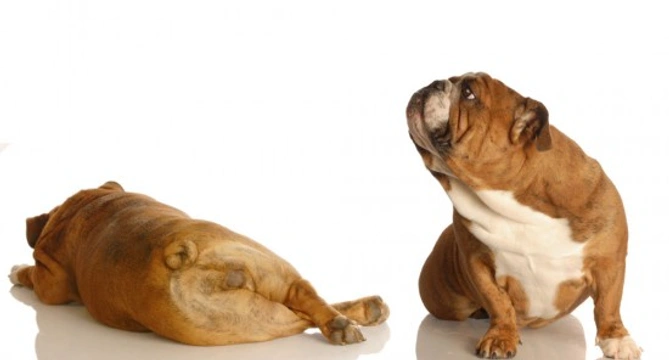
Dogs and flatulence - dealing with a stinky dog
Unless you are incredibly lucky, at some point or other most dog owners will have found themselves within smelling distance of some rather noxious emissions from the back end of their pet. A farting dog can clear a room in seconds, and can be in equal parts disgusting and amusing depending on the company you are keeping at the time!For some dogs, gas isn’t a big deal and you might not even be aware when they are passing wind- if so, lucky you! But many dogs can often appear to have much in common with a walking stink bomb, and their wind issues may at times appear to be pretty out of control.Are you tired of walking around with a peg on your nose while your dog is in the house? Wondering if there is anything you can do about it, or if you should be concerned, other than for your own comfort? Read on to find out more!
Why are some dogs particularly windy?
Flatulence, the polite term for ‘farting,’ occurs in dogs for much the same reasons that it does in people. A build up of gas and air within the digestive system has to come out somewhere, and this gas will eventually emerge either as a burp, or more commonly in dogs, from the opposite end as flatulence.Sometimes flatulence can be symptomatic of a digestive problem or an underlying medical condition, but the physical cause of the build up of gas within the digestive system of your dog itself occurs due to one or more of three things.
- The natural accumulation of gas within the digestive tract is just a part of eating, but excessive gas build up will cause flatulence. Excessive gas may build up if food reaches the colon before becoming properly digested, due to the bacteria in the colon reacting with it. This is often due to feeding an inappropriate diet or foods that do not agree with your dog.
- Eating particularly quickly and gulping down food also leads to a large amount of air entering the stomach along with the meal, which of course has to come back out! This air does not normally smell particularly bad (although having been through the innards of a dog first, it is not likely to smell that good either)! But it can lead to noisy flatulence and the often comedic farting sounds that some dogs are known for.
- Stomach upsets, infections and disorders of the stomach, bowels and GI tract can all also lead to the emission of noxious smelling gases.
What can be done about excessive flatulence?
In order to be able to address the issue of flatulence in your dog, first you will have to identify the cause of the problem and then attempt to correct it.
- If you have changed your dog’s diet recently and they have developed flatulence around the same time as this, your solution might be as simple as that; re-addressing your dog’s diet. Cheaper diets, even ones that purport to be complete foods, often contain more bulking agents, artificial colours, flavours and preservatives than higher quality products, and do not necessarily provide the optimum nutrition for ease of digestion that your dog needs. Diets that contain dairy products, beans, soya and peas are all often connected to dietary flatulence in dogs.
- Check that your dog is healthy and passing stools normally. If they have diarrhoea, loose stools, an upset stomach, vomiting or anything else unusual going on, take them to the vet for a check up to establish that an infection or underlying health condition is not the cause of the problem. If your dog has not had a regular check up within the last six months, you might wish to take them along for a quick look over just to be on the safe side.
- Watch your dog when he is eating- does he wolf down his food and eat particularly fast? If so, then gulping in too much air with his food is likely to be the cause of his emissions, and so you will need to attempt to slow down his eating. Feed several small meals throughout the day rather than one large one, or consider other ways to slow him down, such as using a special bowl designed for the purpose, or placing a large, hard rubber ball in his dish that he has to eat around.
- Consider feeding a supplement such as a probiotic to support the healthy bacteria of the gut and so increase the level of good bacteria in the digestive system, which can help to reduce stinky emissions.
- Try to boost your dog’s metabolism, in order to help them to process their food more efficiently and comfortably by increasing their exercise levels. A short walk half an hour after your dog has eaten can prove a helpful aid to digestion, and help to get everything moving smoothly and as it should, as well as allowing your dog to digest their food and pass wind if they need to while outside, where it will be less noticeable!



